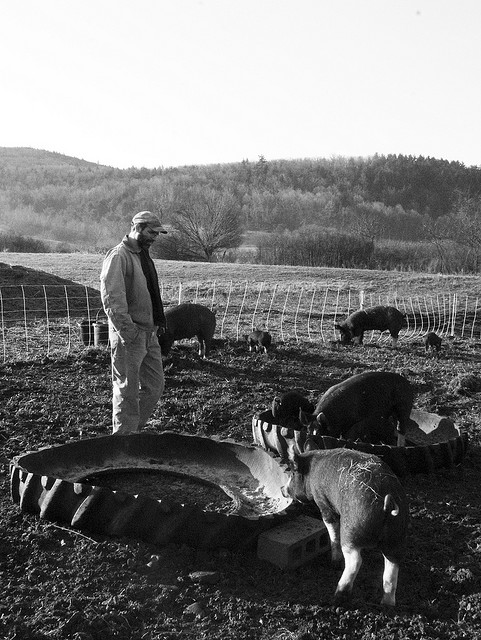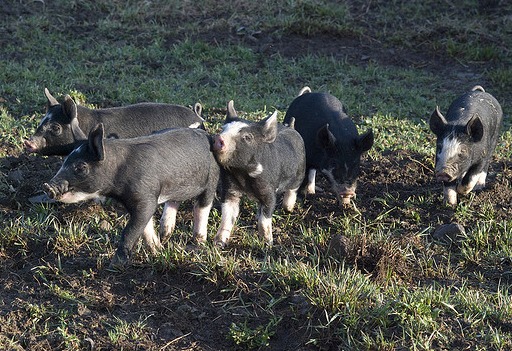 Bob Comis with his porkers. Will they leave the land more productive than they found it? Photo: Zach Phillips The concept of sustainability isn’t very useful as a critique of industrial agriculture — all you have to do is create a friendly definition of “sustainable,” and the critique is turned on its head.
Bob Comis with his porkers. Will they leave the land more productive than they found it? Photo: Zach Phillips The concept of sustainability isn’t very useful as a critique of industrial agriculture — all you have to do is create a friendly definition of “sustainable,” and the critique is turned on its head.
However, sustainability does interest me as it relates to my own farm. Am I farming sustainably? That is, am I farming in such a way that the land I work will be as, or even more, productive for future generations? Or, am I farming unsustainably — that is, will the ability of future generations to produce on land that I am working today be compromised by how I’m farming?
Mine is a pasture-based farm, so one might intuitively say yes, that I am farming sustainably. However, because I raise pigs, I have chosen high-protein and high-energy annual pasture crops rather than mixed grass permanent pastures. This means that every year, at least once, the pig pastures are plowed and planted. To do this, I use a 100 horse-power tractor and a four-bottom plow. The fields must also be disked as many as three times to prepare a seed bed and to control weeds. Finally, the seed needs to be sown, and in the case of corn, the crop needs to be cultivated to control weeds. All of this takes diesel fuel, a lot of diesel fuel. Diesel, of course, is a form of refined crude oil. Our oil reserves, as we know, are depleting.
Therefore, in a peak oil, or post-peak oil, era, my farming practices are problematic. However, it is no large leap to imagine alternatively powered tractors that are every bit as powerful as today’s diesel tractors. So, for me, motive power is not a sustainability question, except in so far as the more diesel we use the quicker our oil reserves will dry up (and to be perfectly honest, I don’t think that is such a bad thing).
As above, the sustainability question for me is about the land. Are my practices harming the land? Are they merely benign? Or, are they in fact improving the land, which is the highest form of sustainability?
Take plowing. It is highly problematic as it exposes bare, unanchored top soil to the elements, to wind and rain/snow, which causes erosion. I work a hillside farm, so I cannot afford to lose a lot of topsoil as there is very little to begin with, and because of the pitch of some of the fields, they are more highly erodible than flat ground.
To mitigate top soil loss, I leave the soil bare for as short a time as I can, and try, as best I can, to keep it covered with a cover crop (generally annual rye grass) over the highly erosive seasons of late fall, winter, and early spring. The cover crop anchors the soil. Nevertheless, bare soil erodes. Period.
Plowing also creates a compacted “hard pan” a few inches below the deepest penetration of the plow. Over time this hard pan can become so compacted that roots (going down) and nutrients (coming up) have difficulty penetrating it. Water drainage can also become a problem. Discing is also a compaction operation.
Thus, in addition to causing erosion problems, plowing and discing cause important soil structure problems. Hard pan can be mitigated by crop rotation, and crops planted specifically to break it up, such as tillage radishes which jab through the hard pan like spears, down as far as three feet, loosen the hard pan up. Hard pan can also be mitigated mechanically using a tractor-drawn tool called a sub-soiler or middle buster.
What about fertilizer, herbicides, pesticides? Am I “poisoning” the land or water in any way? I use no petrochemicals on the land. Fertilizer comes from animal manure (pig, primarily, but also sheep) spread directly by the animals themselves during the growing season, and by me in the spring, and also by spreading the winter bedding packs, compost (an excellent soil structure and slow release fertilizer amendment), and green manures like the clovers and buckwheat, which are not grown for harvest by animal or machine, but in order to plow or disk back into the ground, providing fertility in the process of decomposition. I use no herbicides or other pesticides.
Instead of utilizing annual crops that require plowing and discing, should I just keep the pigs on permanent mixed grass pastures to preserve the top soil and soil structure, even though these permanent pastures provide very little in the way of pig nutrition? Pigs need to get concentrated energy from somewhere, so if I am not plowing myself, I’ll have to buy grain grown on some other farmer’s plowed field.
So, am I farming sustainably? If not, what should I change?



